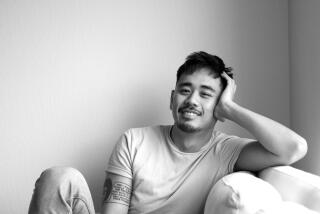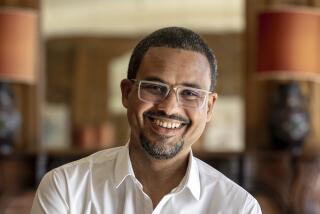Raden Hardo as Ivan Denisovich : THE FUGITIVE <i> by Pramoedya Ananta Toer (William Morrow: $16.95; 171 pp.; 0-688-08698-5)</i>
- Share via
Pramoedya Ananta Toer has lived the life of an Indonesian Solzhenitsyn. He was imprisoned by Dutch colonialists from 1947 to 1949, during which time he wrote “The Fugitive,” his slender first novel and the first of his works to be published in the United States. From 1965--Indonesia’s tumultuous “Year of Living Dangerously”--until 1979, he was jailed on the island of Buru by the military government and is today confined to a small area near his home in a suburb of Jakarta.
The PEN American Center awarded him its 1988 Freedom-to-Write Award. In addition to his own work, much of which is banned, Toer has translated the novels of Tolstoy, Gorki and Steinbeck. As many as half a million photocopied-- samizdat-- versions of his most recent novel are thought to be in circulation.
“The Fugitive” is in many ways a road map of the life Toer was to lead for the next 40 years: While his moral compass occasionally sent him down some of history’s blind alleys, his conscience always destined him for dissidence.
The novel tells the story of a poor Javanese youth--from Toer’s native village of Blora--who collaborated with the invading Japanese Army at the outset of World War II and then joined a short-lived, nationalist revolt against the Imperial forces. Set in the 24 hours before Japan’s surrender, much of the activity takes place in the dark, structured like a traditional shadow-puppet play, with the tropical air heavy with impending but unpredictable tragedy.
Disguised as an emaciated, itinerant beggar, Raden Hardo returns to his village despite the threat of execution. Beginning in the twilight, through the night and morning hours, the young military commander engages in dialogues with his fiancee’s father, who informs on him; his father, who doubts the fateful course he has chosen, and two of his revolutionary colleagues, who accuse him of sentimentality.
In imaginary colloquies, he addresses his devoted fiancee and the comrade who may have betrayed his rebellion, and is now pursuing him on behalf of the Japanese. Hardo embodies the pure, brave, forgiving spirit of struggle--nearly Christlike--but he is portrayed by Toer without cliche. In the brief time period covered by the novel, Toer encapsulates the high cost that rebellion and revolution can exact, often turning idealists into corpses or--if they survive and triumph--into unfeeling autocrats.
“We have to try to free ourselves from our present bonds and to climb upward, even if it means we will be bound again,” Hardo tells his father. “Freedom is upward, not down!” The father, still uncertain the man he is speaking to is his son, says “Freedom from oppression? Rubbish! You’ll end up a sacrificial lamb, dying in your own entrails.”
The novel is no less compelling for being an easy, accessible read, although it does have more the feel of an episodic fragment of one of Toer’s future epics than that of an independent work. The prose, translated by Willem Samuels, is evocative, almost intoxicating: “Clusters of bamboo at the base of the darkened sky, a fence for the city beyond, swayed back and forth. Between the bamboo poles the street lamps played a game of hide and seek.”
Throughout the 20th century, liberals confronting authoritarian regimes and oppressive colonial occupations have had to grapple with a conundrum: The same idealism and sense of humanity that draws people to revolution is frequently squeezed, bled or tortured out of them by the time they triumph. Frequently, the Hardos of this world--like the Augusto Sandinos, Eduardo Mondlanes and Benigno Aquinos--do not complete the journey from the jungle and the street to the Presidential palace. (Nelson Mandela may prove to be an exception.) Some very hard people do survive to preside after “liberation.”
With Europe’s Thirty Years’ War a distant historical footnote, it is difficult for most of us to comprehend that in the space of a single lifetime it was possible for an Indonesian to have fought the Dutch in the 1930s, the Japanese during World War II, again the Dutch--aided by the British--and Indonesian collaborationists after the war, and then the Indonesian government after independence. Or for a Vietnamese to have fought the French before the war, the Japanese during the war, the French again, the Americans and their Vietnamese allies until victory in the South, and then their former allies, the Cambodian Khmer Rouge.
More often than not, when a sustained, violent effort has been required to overthrow an entrenched administration, those with the discipline and resolve to lead the struggle have been Marxists. And the people who make the most effective and durable revolutionaries do not always turn out to be the most humanistic rulers.
In the course of such prolonged, conspiratorial struggles, betrayal is rife and romantic rivalries can turn fatal. Debts are incurred, some based on ideological or personal disagreements that in retrospect seem trivial. Add to this the inevitable corruption of power and the recipe for tyranny is complete.
In 1956, after Indonesia’s independence, Toer traveled to Beijing where he was impressed with the accomplishments of the Chinese revolution. Although an ethnic Javanese, he published a defense of Indonesia’s large (and suspect) Chinese minority in 1960, which first got him into trouble with the corrupted Sukarno government.
In 1965, a failed leftist coup supported by the Communist Party of Indonesia (PKI) and backed by the Chinese Communists resulted in the death of more than 300,000 people. Thousands more, including Toer, were imprisoned without trial. His library, notes and manuscripts were burned and his writings banned.
Yet in 1989--China’s own year of living dangerously--when the democracy movement was crushed in Tian An Men Square, Toer did not hesitate to speak up. In an interview with Susanna Baird, published in the PEN Center USA West Newsletter, the 65-year-old Toer said:
“I am an older man now. I can only look at life through my own experience. The best years of my young life were taken from me, along with my civil rights, my house and my family. All I want is that this does not happen to anyone else. I want people to focus their attention on the youth of China and other places in the world where people’s rights are being taken away. Let the people do what they have to do in life.
“I stand on the side of the students, because no matter what the elder generation may say, the future is in the hands of the students. It happens not only in China, but wherever a government is in power too long, that continually denies people its rights. I curse the force that put down the student movement.”
Perhaps with an eye toward a future Nobel Prize, Morrow plans to publish all of Toer’s major works among his 30 books of fiction and nonfiction, already translated into 16 languages.
More to Read
Sign up for our Book Club newsletter
Get the latest news, events and more from the Los Angeles Times Book Club, and help us get L.A. reading and talking.
You may occasionally receive promotional content from the Los Angeles Times.









